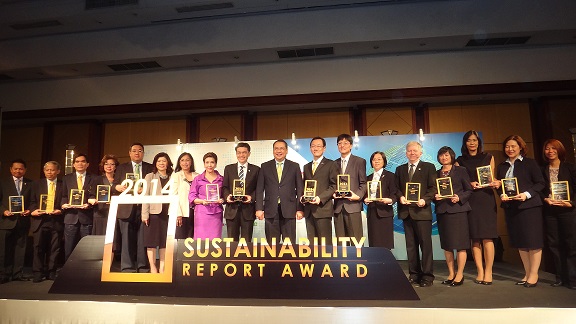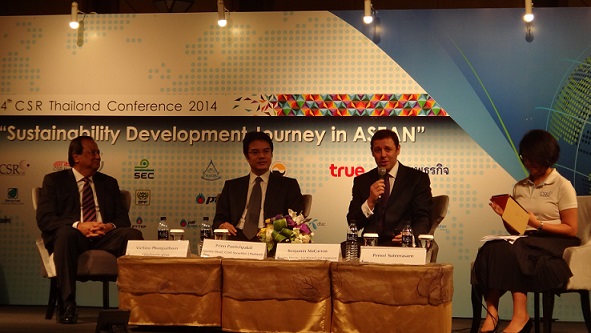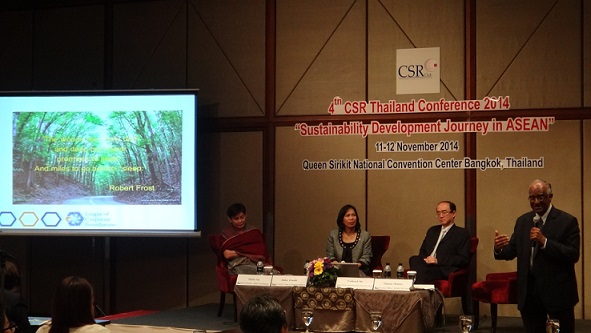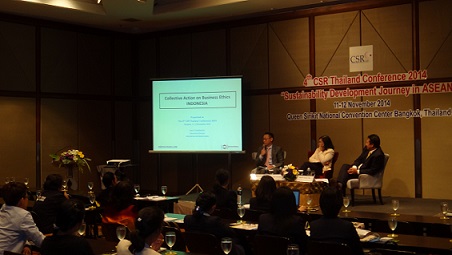CSR Thailand Conference 2014 highlights imperative of integrating CSR and sustainability into business strategy
Bangkok, Thailand, 13 November – Themed “Sustainability Development Journey in ASEAN”, the 4th CSR Thailand Conference held at the Queen Sirikit National Convention Center in Bangkok, Thailand on 11-12 November 2014 aimed to encourage the private sector in Thailand to integrate corporate social responsibility (CSR) and sustainability into their business strategy and operations at national and regional levels.
Speaking at the Sustainability Reporting Awards ceremony on the second day of the Conference (12 November), Chair of ASEAN CSR Network (ACN) Ms. Yanti Triwadiantini congratulated the winners on their dedication to sustainable business practices and sustainability reporting.
“I urged all business leaders to continue to uphold, if you have already started, or to quickly adopt, if you still hesitate to do so, social and environmental sustainability as a key part of your business consideration, making it a DNA of our regional business community in the years to come”, said Ms. Triwadiantini.
Three most Outstanding Sustainability Report Awards were given to Siam Cement (Excellence Sustainability Report) and Thai Oil and Bangchak Petroleum (Best Sustainability Report). This is the second year Sustainability Reporting Awards were given to companies in Thailand to encourage ongoing reporting methods as part of a business plan and to create awareness of CSR.

In the next plenary sessions, representatives of companies, business networks and think-thank groups discussed emerging issues regarding sustainable development and shared good practices.
Mr. Benjarmin MccCarron, Managing Director of Asia Research and Engagement, highlighted the importance of energy and water security. He said identifying risks and opportunities, investment in research and development, linking sustainability with innovating, and being transparent and accountable will help companies create competitive advantages and thus achieve sustainability.
Mr. Prinn Panitchapakdi, Country Head of CLSA Securities (Thailand) Ltd, believed promoting good corporate governance is important to sustainable development. He called for “the tone from the top” in SMEs and the model role of agencies such as the Stock Exchange and the Securities and Exchange Commission in practicing CSR in Thailand.
Mr. Vichien Phongsathorn, President and Group CEO of the Premier Group of Companies, reflected on the risks and responsibilities that Thailand and other countries are facing and need to undertake. These include but not limited to the high rate of environmental degradation with global warming and pollution, society is at risk with high poverty incidence and pervasive corruption. A multi-stakeholder effort, or a harmonious alignment of business sector, employees, and societies, is fundamental to success, Mr. Phongsathorn said.

Ms. Elisabeth Biering, Director Sustainability of the Telenor Group shared with participants Telenor’s sustainability approach – “creating shared value” in the supply chain. Telenor has been working with suppliers to build capacities, assess the risks and ensure decent working conditions and other responsible business practices as well as extend the benefits of mobile to include more people. Telenor has also focused on improving energy efficiency through leveraging mobile technology, advancing the environmental management systems, and ensuring transparency through sustainability reporting.
Creating shared value is also the core of Nestlé Strategic performance framework, said Ms. Tengku Ida Ismail, Head of Legal and Secretariat, Nestlé Malaysia and Singapore. Nutrition, water, and rural development has been key focus areas for Nestlé with the strategic aim of building trust and competitive advantage for Nestlé in the value chain.
“At Nestlé, we have always believed that for our business to prosper so too must the communities in which we operate and which we serve prosper, and that healthy communities, populations, economies and business are mutually reinforcing”, Ms. Tengku Ida Ismail emphasized.
The plenary sessions were followed by two breakout sessions on business and anti-corruption, and creating a CSR culture. Panelists and participants agreed that it is important to create a culture of CSR in the region if ASEAN and its member states are to achieve sustainable development. Key drivers for this effort are good governance and successful multi-stakeholder engagement.

Corruption is not a culture of ASEAN, yet it has become a common habit. It is now imperative for ASEAN to stop this habit before it becomes a cultural norm in the region. A strong enforcement and monitoring system with regional standard for companies to benchmark was said to be desirable.

The CSR Thailand Conference was organized by the CSR Club of the Thai Listed Companies Association. The ACN has supported the Conference since 2011.
On the side-line of the Conference, on 11 November, a memorandum of understanding (MOU) was signed between the Regional Working Group on Business Integrity, represented by ACN CEO Mr. Thomas Thomas, and the Private Sector Collective Action Coalition against Corruption of Thailand, represented by Thai Institute Directors President and CEO Mr. Bandid Nijathaworn.
The MOU on regional cooperation against corruption in the ASEAN business community was signed previously among 6 private sector networks on 18 September 2014 and was announced on the occasion of the 4th Integrity Summit on 19 September 2014 in Manila, Philippines.
For more details, please contact the ACN at info@asean-csr-network.org.
